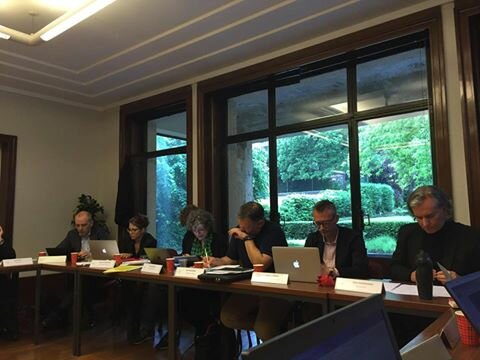Workshop agenda
This closed-door scientific workshop constituted the central piece of ENLIGHTEN’s first work package. Accordingly, the research which this workshop is to see presented, discussed and ultimately published will contribute towards meeting the WP’s epistemic objective of contributing towards a common theoretical framework articulating the role of ideas and implications of new policy instruments associated with the novel modes of European governance born from the recent €-zone crisis.
To this end, the workshop explored both how some policy ideas and knowledge-based networks help to explain patterns of policy innovation and governance change; as well as, assess the implications in legitimacy born from the new policy instruments progressively since the start of the so-called euro-zone crisis.
In line with this two-pronged agenda the scheduled contributions were clustered along two thematic days: first a set of two panels on “New Modes of Governance and the Circulation of Ideas” followed by a second day offering three panels on “New Modes of Governance and the Implementation of New Instruments”.
Workshop format
The Workshop was coordinated by lead scientists and will address one of two sub-themes identified within each of WP.1’s two agreed upon constituent focal points with regards to the emerging forms of European governance in the aftermath of the recent Eurozone-crisis: (1) Legitimacy and the circulation of Ideas, on the one hand; and (2) Legitimacy and evolving policy instruments, on the other. The workshop seeked to facilitate the delivery of the minimum number of quality scientific articles to justify the submission of a “Journal Special Issue” on each of these two topics.
This ENLIGHTEN scientific Workshop was:
- Closed to workshop members only
- One-to-two day long events bringing together a set of scientists – both junior and senior – all of which are expected to produce innovative scientific articles within one of the two identified specific topics.
- Under the stewardship of the workshop’s coordinators, the papers were discussed, honed and developed towards the scheduled special issues.
- Participating scientist were invited from across the network and beyond.
This ENLIGHTEN scientific Workshop agreed upon procedures were:
(The format is chosen in order to ensure in-depth and lively debates in a collegial and informal format)
- All participants were expected to read the papers beforehand and prepare comments
- For each of a session’s scheduled papers, a chairperson has first yield the floor to a discussant who kicked off the discussion of a given paper by briefly summarizing the paper and identifying key points to be discussed. Discussants’ interventions are not to last more than 10 minutes
- Then the paper’s authors were invited by the chairperson to respond to the discussants comments and provide further indications. An author’s initial response should be around 10 minutes long
- Subsequently, the chairperson opened the floor to all participants. The chairperson managed the discussion
The expected Outcomes/Deliverables of the workshop are two submissions for a special issue in a peer-reviewed journal. A first proposal would be rooted in the first day’s work on “New Modes of Governance and the Circulation of Ideas”; a second submission would reflect the second day’s work on “New Modes of Governance and the Implementation of New Instruments”. All participating academics and researchers (whether as paper-giver or as chair-discussant) are invited to contribute to the manuscript. The organizers of the workshop and the ENLGITHEN program hope to see the manuscripts to be submitted to the jointly identified journals within the three months following the workshop in Brussels.

